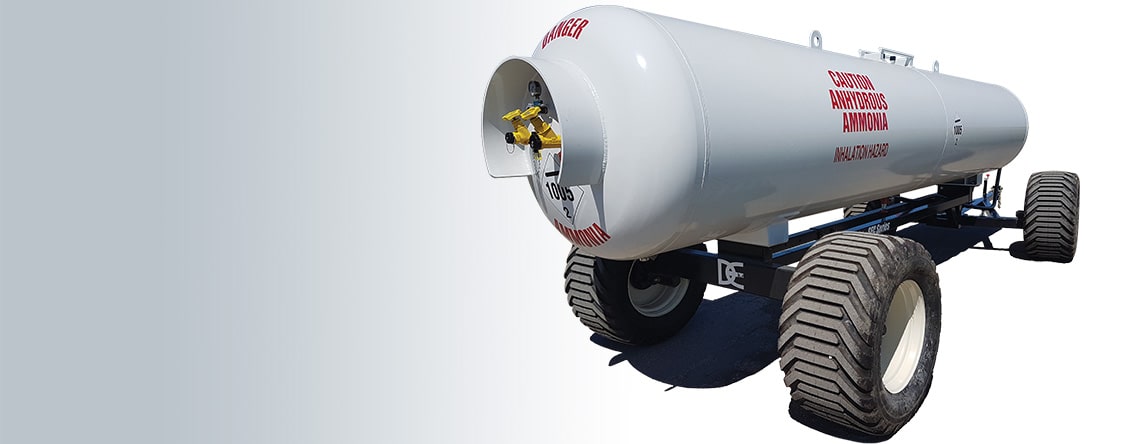Retailers play an important role in farmer education.
CAAR’s executive director Mitch Rezansoff says the safe handling of anhydrous ammonia shouldn’t end with the delivery to the customer, and retailers who sell the product should take the next step to see it through its lifecycle, even after the sale has been completed.
According to Rezansoff, it is the collective responsibility of the entire industry to ensure that the product is transported, stored and applied in accordance to regulations and with the utmost care.
“Whether it’s fertilizer products or crop protection products, we all have an obligation to ensure that, from manufacturer to end user, the product is used in accordance to the recommendations for safe handling and we’re being environmentally responsible in how it’s being used,” says Rezansoff.
“At the end of the day, whether we are a farmer association or a retail association, or a producer, supplier or distributor association, whatever we do impacts the end customer – the farmer,” he says.
To help ensure the safe handling of this vital product doesn’t end at the farm gate, CAAR recently worked with Fertilizer Canada on an update of the anhydrous ammonia farmer training course, “Anhydrous Ammonia: Safety & the Farmer.”
The updated video and training manual, which were released by Fertilizer Canada to coincide with Canadian Ag Safety Week, a safety awareness campaign held annually in March, is available to farmers free of charge on both caar.org and fertilizercanada.ca.
Both Rezansoff and Garth Whyte, president and CEO of Fertilizer Canada agree that ag retailers will play an important role in the course’s reach and ongoing success.
“Safety is a shared priority across our industry,” says Whyte. “Through our long-standing partnership with CAAR, Fertilizer Canada is able to offer this course across multiple platforms, ensuring that the training resources reach a broader base of farmer customers.”
Rezansoff is encouraging retailers to reach out to their grower customers who handle anhydrous ammonia and direct them to the course. He says it’s in the retailer’s best interest to ensure farmers are continually maintaining a level of safety; through proper handling, inspections, safeguards and by making sure their employees understand the risks of handling the product and are trained accordingly.
Farmers can contribute to their overall training requirements by taking the “Anhydrous Ammonia: Safety & the Farmer” course, and, upon successful completion, will receive a Transportation of Dangerous Goods (TDG) training certificate from CAAR.
The course covers safe handling of anhydrous ammonia, nurse tank and applicator unit maintenance, connection and disconnection procedures, first aid information, incident reporting and TDG legislation.
In the development of their new training manual and video, Fertilizer Canada worked with industry members, including CAAR, who were called on to provide their expertise. The new manual contains information that aligns with both the current TDG regulations and Fertilizer Canada’s Anhydrous Ammonia Code of Practice, and serves as a comprehensive companion to the video, which has been fully updated to include demonstrations of each of the safety procedures outlined in the training program.
Safer Together
Course materials are now available to farmers through CAAR’s online training portal. Retailers can also download materials and host an on-site group training session for their grower customers.
Rezansoff says hosting a hands-on training session is a great way for a retail to enhance the customer experience, serving as an opportunity for retailers to engage and connect with their customers on another level, while demonstrating a commitment to safe handling of anhydrous ammonia. Retailers who are interested in hosting a training session are encouraged to contact the CAAR office at This email address is being protected from spambots. You need JavaScript enabled to view it. for more information.
Whether they host group training or simply direct farmers to the online course, Rezansoff hopes that retailers will use the refreshed course as an opportunity to interact with their customers and take on an active role in the safe and responsible use of the products they sell.
“We have a responsibility to ensure that the products our retailers are supplying to farm customers are used in accordance with the stipulations of the safety code of practice,” says Rezansoff. “It’s to protect the farm customer, but also the community at large.”
Click here to view the “Anhydrous Ammonia: Safety & the Farmer” course.
Related Articles
- Rage against the European Union Although the weeks-long protest and blockades in France may have halted on February 1, 2024, farmers in other European countries have taken up the cause with their protests. By Andrew Joseph, Editor Like a revolu...
- Increasing your company’s brand reputation A well-thought-out brand marketing campaign will help you grow and promote your brand. By Andrew Joseph, Editor A company is often only as good as how the customer or consumer perceives it to be. It doesn’t even...
- Show your mature workforce the love they deserve Learn how the top employers support the ever-evolving needs of their employees through their changing career phases. By Denise Faguy, Associate Editor If there’s one thing all within CAAR can agree upon, is that ...
- December 2023 issue of CAAR Communicator now available online The December issue of CAAR Communicator should be arriving in your mailbox any time soon. The feature article looks at the increase in strikes across the country, among other things. The December issue of CAAR ...
- Anhydrous Ammonia safety - A top priority after harvest Safety experts emphasize the importance of prioritizing safety when using anhydrous ammonia (NH3) after harvest to avoid accidents and ensure a secure farming environment. As the post-harvest season approaches, f...
 How to resolve AdBlock issue?
How to resolve AdBlock issue? 
Join the discussion...
You must be logged in as a CAAR member to comment.
Report
My comments